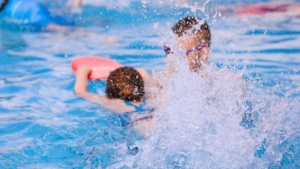 6 Things You Should Know About Swim Lessons
6 Things You Should Know About Swim Lessons
Information courtesy of | College Station Parks & Recreation
Just about everyone enjoys getting outdoors and enjoying the sunshine when the weather gets warmer. What’s more fun than heading to the beach, pool, lake, or river for a family vacation or quick getaway?
Millions of people of all ages enjoy the pleasures and health benefits of swimming, water skiing, fishing, and boating. The reason is crystal clear – it’s incredibly fun to be in or near the water.
But water-related activities can also be hazardous – if you or your loved ones don’t know how to swim. Children under four years old have the highest drowning rates, most occurring in swimming pools. Another seven receive emergency care for non-fatal drowning for every child who dies from drowning.
Learning to be a capable swimmer is an essential life skill and should be a priority for your entire family. Here are six things you should know about swim lessons:
- Six months old isn’t too young to start.
Swim lessons for parents and babies are the first steps toward water safety. Parents can strengthen the bond with their infants and develop a safe water environment.
- Teaching fundamental skills to 1–4-year-olds is crucial.
Young children can listen to instructions, follow directions, and retain what they’ve learned. They can learn basic skills to use if they fall in the water, such as getting back to the side of the pool.
- Caregivers can benefit from lessons, too.
Caregivers can stay for the entire class and learn how to helps the kids practice their skills at home. We encourage parents to watch at least the beginning and end of a lesson. Many pools have an observation window or deck.
- Flotation devices should be used thoughtfully.
Experts continue to debate about the effectiveness of using flotation devices to teach children to swim. The devices can keep children safe initially and help them learn proper positioning and stroke mechanics instead of frantically waving their arms to stay afloat. Regardless, their use should be gradually decreased as the lessons progress to reduce overreliance.
- Fear of the water isn’t an excuse.
It’s normal to be afraid of the water, and some children (and adults) are more fearful than others. While you don’t want to force a child to do something that terrifies them, giving up isn’t a good idea, either. Start gradually, with lots of positive reinforcement. The swim instructor will be more than willing to help.
- Always watch your kids in the water.
Even if they’re strong swimmers, children can get tired, hurt, trapped, snagged, or disoriented. Always watch your kids closely and avoid distractions. While swimming lessons help save lives, children should have constant and vigilant supervision around water. For boating and other water sports, make sure they always wear a life jacket, too.
The City of College Station’s Aquatics Division is devoted to teaching people to swim correctly, safely, and confidently. We have various swim lessons available for ages six months to adult and those with special needs.
Beginning Monday, April 3, you can register for classes online or call 979.764.3468. You can also signup at the Stephen C. Beachy Beachy Central Park office. If you’re planning to enroll your kids, we encourage you first to review the Swim Parent Handbook. For more information, visit cstx.gov/pools or call 979.764.3486.
Learning to swim can lead to a lifetime of safe fun and enjoyment around the water.